
The Line
The law of the those born to the oppressive sun and worthless sand is both harsh and constant, as things can be constant. Braeburn knows the law; it lives in his bones. It sings in his ears. It groans in his muscles and in his sinews as he struggles into the harness, the one he took down from the dusty shelf in the backroom. A young niece meekly helps him with the straps. She is shaking all the while, and will not look at him, not at the burden she is securing to her uncle Braeburn's strong back.
For his part, the farmer is silent. It is a bizarre moment, and he is self-aware enough to realize it. For the first time in his life, he has nothing to say. This is not the rivalry of the buffalo, nor is it an argument between ponies settled over conciliatory words and a round of salt on his tab. He's known that since the chieftain of the buffalo lay wheezing on the floor of the saloon, his great and old hide riddled with bullets. It is beyond his words and enthusiasm.
But his character has not changed. He is still Braeburn, and his tongue still needs to wag. "It'll be fine, Blossom," he says. His voice is like a tattered sail, and he tries not to wince at it.
"Yessir," the filly says, and backs away. "I'm done, Uncle Brae."
"Guess ya are."
She stares at the rifle now slung over his shoulder. It is almost the length of his body, with an antique loading mechanism that rests on his back where a saddle might. A metallic arm is before him, and a bit with two large, easily pushed buttons. If he grips one with his teeth, he loads his father's rifle. If he bites down on the other, he unleashes death. A small targeting reticle that swivels up is folded to the side. It is all very worn, and the metal is cold, far too cold.
"Wish I wasn't," he says.
"Uncle Brae... You don't gotta. My daddy isn't."
"Your daddy also hurt himself last month. No, I gotta go, sugarcube."
She will not answer. She sits sullenly against the wall. He considers staying, then. Sees himself in the backroom. Perhaps even in the doorway, guarding the house and his kin. Yes, that's how he would frame it. He realized that no pony was around to watch after little Blossom and her mama.
He sighs. Of course, Blossom's mama could buck him into next week, so that was not his brightest idea ever. She didn't need a wannabe cowpony cowering in her living room.
"I'm sorry," he manages.
"Ain't everypony?" The filly says, staring at the wooden floor. "I'm really tired, Uncle Brae. And scared. And I don't wanna be here."
"It's home, Blossom. Ain't nothin' to be done for it. I'll be back. Your mama'll keep you safe, I'd bet half my orchard on it. But I'll be back, okay?"
She shrugs.
Braeburn leaves out the squeaky front door, painted red only last month by his own effort, before he can lose his nerve.
There are ponies in the dirt streets of Appaloosa. He knows them all—he is related to almost half of them. An uncle here, a nephew there, his second cousin, the list goes on. Most of them are stallions, but there are mares milling about as well. Most have firearms of various types, all of them old and half-forgotten. The settler ponies look uneasy, lost, as if they have been cut out of the fabric of the world and grafted in somewhere else entirely. The Sherrif sees Braeburn and hurries over.
"Brae! Was hopin' you'd come 'long. The Buffalo want to take the west part of town. I was thinking you could take your kin and guard the east."
"Sure," he says limply.
The Sherrif is a good pony. He is also afraid, Braeburn sees it in how he sweats. He is nervous and jumpy, his own rifle only a few years younger than Braeburn's father's piece.
Braeburn is not thinking of the law. In fact, he does not think of it as the law of the desert—the phrase has never occurred to him at any point. He is in all honesty not thinking at all. Rather, the farmer calls names by rote, gathering ponies from the parting crowd. They come with obedient tread, their faces all so very different and familiar. He knows them all.
"Y'all ready?"
"Naw," one pipes up.
"Yeah," he answers, his jaw weak. "Let's go."
It is a simple matter in some ways. In other ways, it is not. He takes the ponies that rally to him and he calls out to a few more. Setting them along the east face of town, he makes sure they are spaced out. In a way, in a strange way, it is like harvest and instead of giving them places to die and deal death he is instead assigning lanes of trees to be bucked and harvested. He is thinking about collection and consumption. Above all, as he picks out a good roof for his pegasus cousin to sit on, he is thinking about how he is already tired.
The sun, hot on his back and harsh on his eyes, reminds Braeburn that it is a little after noontime and the shadows are returning. He wishes it were earlier. Shadows are dangerous. They are the mark of the enemy.
They will of course rise up out of the desert and be far out of the range of his ancient weapon. He knows this, but if does not stop him from imagining one right on top of him, jumping out from behind the house that he now leans against. There is fidgeting and silent counting and a wild imagination and then frustration. Time is slow and a pony's heart beats too fast and too shortly.
The street is barren as the desert at first glance. His continued perusal—for he has become truly desertborn and knows that there is always more to see—reveals ponies that cannot be still as they wait for the moment of conflict. They are all like him, or so he thinks as the desert's mantle weighs on his rustic, calloused shoulders. He wonders if they all think about the barren and cracked land that is home and the faith they place at the foot of the rocky crags in this little town. How tenuous it is. No speculation on the alien, wide thoughts of the buffalo he cannot see.
There is silence for an hour. The world is holding its breath, for the wind dies.
When he hears it, he does not panic. In fact, it hardly registers.
"Brae! Oh Celestia, Brae!"
Oh. Oh yes, the farmer thinks to himself as the foreign weight of the rifle reminds him like the touch of a chiding teacher. War is in the air, the taste of acid from an upset stomach and the sudden lump in his throat helping to goad him.
"Braeburn!"
"Hold your horses," he says stiffly as he looks out over the wasteland.
Yes, he sees them. Vague impressions, the trick of the desert, but he knows how to look and how to look past and so he sees them. The foe slouches and dawdles. Were Braeburn not a pony of the desert and the field, he would think them reluctant. But it is otherwise, and he knows that they are simply not rushed. There is no need, really, for haste. Not yet. Why should they rush through the town’s demise when there is nowhere for the ponies of Appaloosa to run, and no time for them to prepare for the likes of the Walkers? It was a meal to be savored, he realized bitterly as he watched the ambling bandits.
“Do we shoot? Brae, what do we do? I see ‘em. Oh, oh gods, I see so many.”
“Y’all don’t do anythin’ quite yet,” Braeburn said, and coughed. “Just be still, why don’tcha? Gimme a minute.”
They move like shadows—no, they flow like water over the harsh rock and cracked dirt. The far dunes are behind them and they have moved out of them onto the cracked lands. Almost in range. He has found a rock that stands alone like a sentinel in the foreground, and from it he has drawn a line going both ways in his mind. They will be in range when they cross that line. They will be shooting back when they cross that line. He has also begun to count them, though it is a losing proposition. It is a losing proposition, for they are like the sand—when he thinks he has an idea of their strength in numbers, he finds he has missed one or counted one thrice. Or perhaps he has missed many. He guesses a dozen. There is no way of knowing. None at all, for he knows that death will only take them away for good and he cannot count ashes and smoke.
Braeburn stands on the porch of his aunt Cobbler's house. He helped build this house and raised it with his back and his sweat. It is comfortable and it is home, in a way.
Out over the desert flats they come, their pace a threatening crawl, their guns and their teeth closer with every moment. He hates it. Braeburn thinks he hates them, but it is too complicated to hate ponies and it is so foreign to him. The silence is not enough to hold him and he is a fish with no water to cradle him.
Shouldering his gun, the farmer steadies his makeshift posse once more. They are nervous, and he wanders if he is nervous or in shock, for he is not shaking. Focusing on the line of ponies that defend his town consumes his thoughts. The buffalo and the other defenders worry him. He is aware so acutely that his back is against the wall.
Somepony panics. The crack of gunfire breaks the tension and the Walkers cease their advance. Cursing, Braeburn loads his rifle by buying down on the bit.
"Just a little closer. A little closer and y'all are as good as gone," he says to himself. "C'mon."
One Walker stands up straight, the dark that he wears as a cloak falling from him. He is in many ways a normal pony. A scar runs across one eye, and his body has seen far too many rough desert days, but he is otherwise normal. It is hard to understand that he is a Walker, but Braeburn does not have time to think about it. He has no time at all, he realizes. The Walker’s shadow returns long enough to grasp the gun from his side and hold it before him as he walks. An Earth pony levitating a gun, and now the facade of normality breaks. It is all wrong, all off. His eyes glow. Where before he looked haggard, his skin looks as if it is dragged over bone and stretched. He is a dead man walking.
Breathe in. Breathe out.
“Closer.”
It is like a challenge, a guantlet thrown down and he is willing to do it. Let them come. For a moment, he feels full and on fire. He is aiming as best he can with the outdated rifle, his shoulder steady from years of work but his legs trembling because he is green as the grass.
There is a silence. His ponies have stopped their trembling.
The Walker comes closer. Closer. He crosses over the border Braeburn has set, and his gun does not waver.
The rifle is Braeburn. He sees through it, he feels through it. His heart and its writhing bitterness launch the bullet as surely as any powder charge.
The shot flies straight and the shot flies true. The shadow swirls up from the ground but it is too late to deflect or guard; there is an earsplitting cry that reminds Braeburn of ravens and the sun shines through the new hole in the bandit’s head. The dark disperses in the slowly fading light.
“Give ‘em hell!” he screams, and it is foolish but suddenly the world is brighter.
The badlands around Appaloosa resound with the sound of gunfire. Sharp cracks and the smell of acrid smoke turn the town into a disorienting mess. The porch railing beside him that he has leaned upon shatters into wooden shards as a bullet thrown from a hard caliber passes by him. He stumbles away, and fate is kind as another whistles by his feet. He holds his hat and the wall stops his fall.
“Shit! Feather! Feather, you hear me?”
Another bullet rips a hole in the door in front of him and he decides that he needs cover, sentiment about building this porch be damned. He fumbles with the door, the advancing line of bandits behind him keeping a steady rain of fire. He hears someone scream somewhere and he does not recognize who it is and he has no idea what that means.
Feather has not answered. The young pegasus is his only link to the rest of the town, and in his delirious panic to get inside Braeburn is suddenly sure that he is dead. He sees him with a bullet through his neck lying flat on the roof.
He still calls, of course. “Feather, I swear to Celestia if you ain’t dead!”
Everything is shaking. There is far too much dust stirred up, far too much smoke. He is not sure if he has lost his mind or if the Walkers have done it again and used whatever powers they wrestled for in whatever dark hole they came from. The shadows will lance out again, he knows they will. He doesn’t wish to see it happen.
This does not stop him from leaning against the wall, under a window. He takes a deep breath and looks around for something to break the glass with.
Outside, as he finds a heavy book and tosses it through the window, he hears another scream and a keening wail that he knows is the preamble to the lances of shadow.
“Aw, c’mon. Jump, shoot. Jump, shoot. Not so bad. Not so bad at all—DAMMIT.”
He moves, and is in the window, firing. He spends the entire magazine, five bullets in all, the roar of the gun in his ear and the heat of it’s fire bouncing off the broken glass and onto his cheek. The Walker who he chooses shifts the intent of his power, and the wailing dies as he tries to hold off the attack. The first two bullets are swallowed up by nebulous pools of black. The second skips off another void and fragments in the dirt, but the last two hit. The Walker jerks, tries to pull his gun up, and then goes rigid and falls into the dust. As soon as he hits he dissolves.
The door that Braeburn closed behind him bows in.
His cousin, an orange pegasus, lies on the fragments, shaking off shards and coughing. Braeburn sees blood.
“Are you hit?” he asks, crawling away from the window, feeling like any moment bullets will pour through it.
“Y-yessir,” the colt manages. He is not quite a child, but he is certainly not a full-grown stallion. “My ear, see?” He shows his wound. There is blood, but it is not bad, and Braeburn sighs.
“I need ya to fly quick as ya can, like a dart, back towards the Sherrif. Can you do that? Stay low, don’t get yourself in any trouble. Don’t be shootin’, you got it? Maybe they’ll—”
More glass shatters in the broken window as lead flies. Someone else screams, and Braeburn lies flatter than he thought ever possible. His legs hurt and glass shards hit his uncovered flank.
“Celestia! Maybe they’ll leave you be if you ain’t a threat right off, you hear? Now get to him and see how they’re all doing. How many there are. Now go!”
“They’re shootin’!” Feather cries, and his voice cracks.
“I know that! Trust me, you’ll be fine. Fine as fine can be.”
“I—”
“Fine! Good. Safe. Unshot. Go!”
Braeburn pushes him towards the back door and he lumbers off through the back door.
The farmer turns his attention to the Walkers. The shooting is less frequent now. He fears the reason. His ponies are probably scattered. He has no idea what’s gone wrong, or if anything has. He just knows that there was screaming and he thinks two of the Walkers are dead and that’s all.
Another bullet cuts through a weak point in the wall, splintering it and whistling past. Braeburn jumps, and knows that he has been pinpointed. To stay still is to die. Quick or dead, quick or dead—he repeats this to himself as he takes a deep breath and sprints out the front door.
A lance of nebulous jet black shoots past him stabbing right past his head. He ducks, and feels the air grow cold as his assailant tries again. There is a cry and the crack of a rifle, and the cold is gone. He calls out thanks and dives into the house across the street.
It is the work of a moment to reload and his head is back out the door, his rifle pointed and hungry. A Walker is almost in the town, firing at one of his ponies—he is sick to see that it a cousin—and Braeburn deals death in four bullets, someone else among the windows and alleys firing as well. Together, their bullets break through and meet their target, who crumples and dissolves.
His cousin—it is Fritter, sweet Fritter—is limping, crying softly, and he knows she is caught too far out. There is no thought involved in his decision, and he does not even consider the lone bullet in his magazine. He simply runs.
Somewhere, he hears somepony calling his name, but he can’t look. Fritter, his young cousin, is in the open. He sees a Walker rise up from behind a rock, training a long rifle at her, and he roars. The rifle swivels and lets out a bullet which clips his shoulder. The force of it knocks him off balance and he careens like a drunk.
He hears Fritter cry out, but he cannot see her. Dust clouds his vision and he crawls to his feet all he sees is the black. The Walker is close. The Walker has come.
“Brae! Braeburn!”
“I’m here, just run,” he says limply.
Her voice sounds far away. His legs feel so tired.
Braeburn wishes that he could lose his burden, let the gun down and lie flat on the gentle earth. He looks down and sees black seeping from a wound there, and with dull eyes he traces the path of the blow. The ichor hangs in midair, cold and alive in some way he does not understand. He is very tired.
“Braeburn!”
There are words he wants to form, but he does not know how or why he should.
The law of the desert is harsh. It is the law of immediate decisions. He has moved and so now he must die, and that is the law, and the law is harsh. This tugs at his mind as it begins to spill out into the void, and Braeburn tries to understand it.
“Braeburn! Uncle Brae!”
He hears the crack of rifle fire. There is no reason to care about it.
But suddenly the sun is back. He feels it on his back and on his cheek and on the blood that seeps down his legs onto the cracked desert ground.
His vision works again. The darkness is washed away by light and he sees the Walker dissolving. His legs, he finds, have given out, and he he lays his head down on the ground and sobs and does not know why.
His cousin is beside him, crying and trying to turn him over. Braeburn allows this, feeling lethargic, if more alert than before.
“Oh Celestia, Celestia, lookit ‘im!” Feather sobs, tears running down his face. “I didn’t think he was alive. Wouldn’t answer. You hear me, don’t ya?”
“Think so,” Braeburn coughs.
“Oh gods, I’m so glad. I thought you died! I’m so sorry, I’m so sorry. I missed. I don’t know how to shoot, I lied because I wanted to come, I don’t know how. I tried, I tried but I just…”
“Who got ‘im?”
“I kept shooting, Uncle Brae.”
Braeburn laughs, and coughs. “Well, a blind hog finds an acorn eventually!” The smile on his face hurts. But he’s alive.
“You ain’t dead,” Braeburn says softly, after a moment. “So I’m going to hazard a guess that there ain’t anybody training a gun on us.”
“No sir. Walkers are gone. I don’t know about the rest of town. I got scared and came back… I’m sorry, I just…”
“Glad you did. Just… let me lie here. I could use some salt. Don’t give me any.” Suddenly, he freezes and tries to rise. Feather keeps him down, dismayed. “Fritter! Oh, Luna! Where is she? How is she?”
“She’s over there,” Feather replies. “Behind me.”
“Is she okay? Tell me quick,” he growls, eyes wide with panic. He is still trying to rise.
“S-she’s fine! Calm down! She made it back to cover when you ran out… Please stay still!”
“Can I see her? I… oh, my head.”
“The Walkers. They got you with magic, Uncle Brae. Or whatever it is.”
He coughs again and lies flat. He is limp, but breathes alright. His chest is torn and bloody, but it is not fatal. “I don’t even know.”
The gunfire is over. He hears nothing except the wind that returns and the sniffling off the young colt who is not really a colt.
“Turn me around, would you? I’m feelin’ kinda lightheaded. And call over Fritter, please?”
Feather does so. Braeburn’s eyes turn away from the ash pile and he is glad to be rid of it. It means nothing to him. But as he sees Appaloosa, he smiles. Because he’s home. Fritter walks out from a house, limping towards him, her eyes full of tears. He will find the dead later. They will be borne up from the ground, where they crossed the thin line, and buried in a quiet, dry place. But it is not time for that yet. Battle ends without climax and leaves nothing behind but the quiet and even though it is void he still finds it comforting.
He is home and that is all that matters. The law of the desert is satisfied, and Death is full and goes back to sleep.


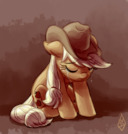
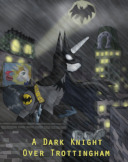
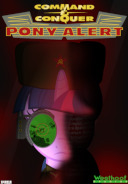

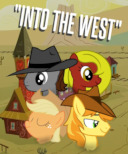
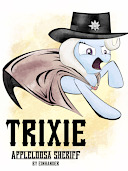

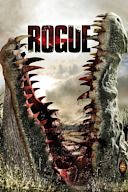


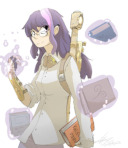

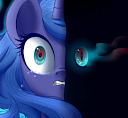
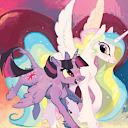


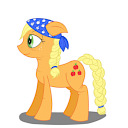
Maybe if we loaded all the guns with apple pie and shot everyone who was bad the world would be a much less sad place.
Maybe.
3088940 I would be down with it
les do it
lets feed the WHOLE WORLD
Dem westerns. And I just started watching Deadwood after you mentioned writing this fic! Can't be a coincidence. Anyway, awesome fight scene. I'm absolutely jealous of you ability to create an engaging battle and make it last for more than a few paragraphs. Another great one for the books!
Whoooooo. Talk about a heavy fic.
Very nice, man. Very nice indeed.
~Skeeter The Lurker
You told me this would make me sad.
It didn't. It's melancholy, but I thankee for it not making me sad. There's a lot I like about it.
The sense of oppressiveness you create with the reference to the Desert, the Law of the Desert, and the heat all create a tenseness and urgency, yet you belie those with Braeburn's methodical, reluctant approach to preparation and the fight. He is a reluctant warrior, as any farmer is, and I think you did a wonderful job of catching the conflict between wanting peace and wanting security. I get the feel, too, that he's a reluctant commander- we see him as a booster of the town, a gregarious pony who wants to show off the pride of his family and people, yet here he's forced to defend it, and I like the sense of uncertainty and distaste for it you create in him.
The battle scene is very nicely done- I love the focus on dialogue and a few small bits of the action from his view, and a fractured, ill-informed view at that. It adds to the tenseness and worry, making the story feel like it's moving while you have time to delve into thoughts, worries, and a dozen little details that fill out the scene.
Relief. I felt relief at the end- and I love the spartan, spare feel of his effort to save Fritter- not overblown, but what had to be done. "Do what has to be done" are words that have echoed through my head for a decade- one of the best mentors I ever had made the pronouncement and I hewed to it. I know it's projection, but I see it being a guiding principle of Braeburn here as well...
IN the first few paragraphs, I initially thought Braeburn was taking the body of the Chief back- the 'burden'. I had to read back to understand it was the GUN, but then I was confused as to why the Chief's bullet-riddled body lay on the floor of the sal... wait, the Walkers use guns too, though they seem to prefer to use magic up close. ANyway.
Very nice job on the villians- a minimalist description gave them all that was needed, while the mystery added to their menace, while it let them be defeatable. You've opened a line of questioning there that I know won't be answered,but is still intriguing.
Damn, but I love how you build characters so quickly and with so few words. And I love your characters too- mostly a little melancholy, but GOOD, trapped in bad circumstances and fighting them.
And Feather... I approve. I really approve, because, well... I guess you see more than you let on. I like him, like him a lot.
Not bad at all, if I do say so myself. Featherprop hit several key points, so I won't bother repeating them.
I personally found the Walkers confusing (and lacking much description), but I guess one could argue that it helps the reader see them from the view of the protagonists. I originally thought they were just bandits, i.e., armed ponies. That's not to say I didn't like the idea of the Walkers, I just would've liked to have known more about them. I did like how... "Cynewulf" they were. That is, I found them very much like your typical antagonists. (The Ghost from Absolution is a great comparison.) It's just cool to see your own style of "evil" personified, I guess.
All in all, the story was sporadic, as Featherprop pointed out. I guess I'm neutral on this aspect. It's somewhere between flash fiction and a short story. I enjoyed it. Now for my inner redneck gun enthusiast question: What kinds of guns are they using? The cover image is that of a lever-action rifle, iconic to the American West, and was often used by cowboys and the like. But you also mention ammo magazines, implying a newer type of gun. It's not that important to the story, I'm just curious is all.
And a few final things:
I believe you meant "gauntlet" here?
I think there may be a word missing here.
DRAGONBORN
This was a good little slice of Western-inspired... something. I'm not really sure what this story is. It's not really a short story, but it's not really anything else either. I enjoyed it nonetheless.